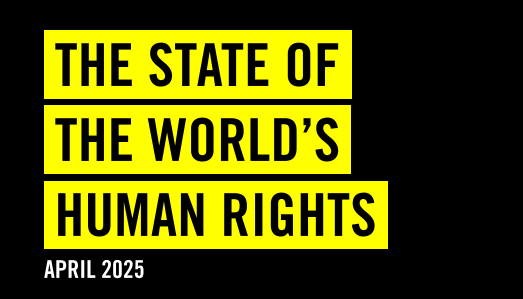Amnesty International: Annual Report on The State of the World’s Human Rights 2025

The annual State of the World’s Human Rights Report, which concerns human rights status and violations around the world in 2024, was published in April 2025 by Amnesty International. In the report, Amnesty warns that the world will face a human rights crisis due to increased authoritarian practices and suppression of dissent and protests. After assessing the situation of human rights in 150 countries, Amnesty International Secretary General Agnes Callamard calls for meaningful collective action by civil society and governments to tackle authoritarian laws and practices that are on the rise worldwide.
With reference to the US, the report mentions that within the first 100 days after taking charge, President Trump intensified the 2024 global regressions and the ‘Trump Effect’ has worsened the damages caused by other authoritarian leaders throughout 2024.
The report documents some worrying trends that prove that the world is backsliding into diminished human rights protection such as the widespread suppression of dissent and protests, escalations of conflicts, inadequate efforts for climate justice, and attacks and exclusion of vulnerable populations like refugees, women and LGBTI people. The situation is set to further deteriorate in 2025 if urgent action is not undertaken. Amnesty heavily criticised the Trump administration for harming international human rights protections and endangering human lives through cuts to humanitarian aid. However, it also warned that Trump alone should not be blamed, as Callamard commented that “this sickness runs much deeper than the actions of President Trump” due to the fact that authoritarian practices like targeting media freedom, peaceful assembly and association among states and worldwide has been steadily increasing for years and “elected leaders willingly act as engines of destruction.”
The report highlights that security forces arbitrarily arrest and use excessive force to suppress protest and civil disobedience like ‘shoot-on-sight’ orders on unarmed demonstrators. Turkey banned protests and demonstrations are met with indiscriminate force and similarly, in Mozambique, crackdowns on protests occurred following disputed elections that killed over 250 people. In the past years, conflicts that devastated millions of lives and led to serious violations of international humanitarian law, have also increased such as the unlawful Israeli conflict against Palestine and the Russian invasion of Ukraine, where civilians were killed daily. Women are increasingly subjected to sexual violence as conflicts affect them disproportionately as it happens in Sudan by the Rapid Support Forces, where two years of civil war have displaced 11 million people internally.
The cuts in foreign aid affected families in detention camps in Syria and have caused malnutrition of children and pregnant women in Yemen. In Myanmar, the Rohingya continues to suffer racist attacks, while in Palestine, Amnesty documents Israel's genocide against the population of Gaza and the intensification of the apartheid system in the West Bank.
The report denounces the rise in discrimination against women and minorities. In Afghanistan, the Taliban introduced further restrictions on women’s presence in public life. In Iran, repression intensified against women challenging the compulsory veil requirement. In Mexico and Colombia, women's collectives searching for missing persons faced threats and attacks. In Malawi, Mali, and Uganda, new laws were introduced to criminalise homosexual relationships. In Georgia and Bulgaria, authorities followed Russia’s example in repressing so-called "LGBTQIA+ propaganda."
The World Human Rights Report also expresses concerns about future generations due to lack of interest by the governments. Agnès Callamard reiterated that 2024 was the hottest year on record and the effects of climate change could be felt through devastating events like floods, droughts and wildfires in South Asia, Southern Africa, and Europe. Future generations are also being harmed due to the government’s failure to regulate new technologies and abuse them to carry out surveillance on citizens and opponents.
Despite the overall negative picture, Amnesty concludes the report with a note of hope, emphasising that in numerous countries, voters rejected leaders that don’t respect human rights at the ballot box, millions of people around the world have raised their voices against injustice, and history shows that it is possible to prevail against authoritarian practices.
Callamard concluded by affirming that the human rights movement "will remain united forever in the common vision of the dignity and rights of every person on this planet," inviting all those who believe in freedom and equality to come together to counter the increasingly extreme attacks on international law and universal human rights.

